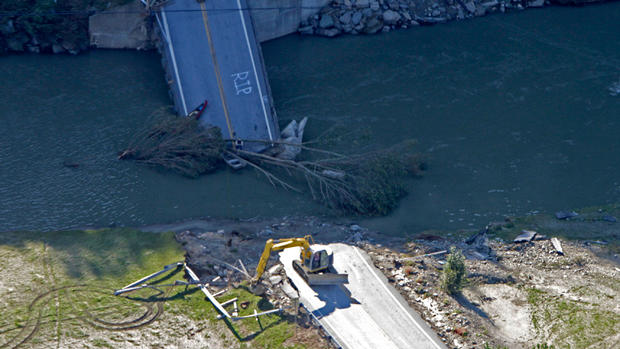East Coast grasps full extent of Irene's damage
BRATTLEBORO, Vt. - Hurricane Irene is now blamed for 49 deaths and billions of dollars in damage, possibly making it one of the 10 most expensive disasters in U.S. history.
More than two million people woke up Monday morning to find themselves without electricity, and, in Vermont, authorities are using helicopters to get food and water to villages which have been cut off, CBS News correspondent Wyatt Andrews reports.
Special Section: Hurricane Irene
Special Section: Hurricane Irene Videos
Irene could be among 10 costliest U.S. disasters
The National Guard made three airdrops of food and water to residents of some towns that are unreachable by land. Irene's torrential rains washed out hundreds of roads and dozens of bridges in Vermont. That airlift was expected to continue Wednesday as the full extent of Irene damage becomes apparent up and down the East Coast.
Just when the people of New Jersey thought the worst was over, the worst arrived. As the Passaic River jumped its banks, thousands had to be rescued by boat, and the residents of Wayne and Paterson begged Gov. Chris Christie for help.
"Just please try to fix the problem," Valerie Meter of Wayne told Christie. "I just moved here in December, and I've now lost my whole house."
The rescue operation meant the state needed more -- not less -- room in the shelters. As the water rose in their basement, the Alvaredos fled their home seeking food for their infant daughter Maya.
"We lost everything," said Miriam Alvardo of Paterson. "We lost everything."
Jennifer Phillip and her family were also shocked into leaving just when they thought the danger had passed.
"I'm not too happy that our house is going to be flooded, and I don't know where we can go now," the little girl said.
On CBS' "The Early Show" Wednesday, Craig Fugate, the administrator for the Federal Emergency Management Agency, said that the agency has funds to respond to Irene's damage. Recently, House Majority Leader Eric Cantor, R-Va., said that any additional tax dollars given to the agency should be offset by cuts elsewhere in the federal budget.
"We have funds to continue response-rescue operations and the immediate needs, and that's been our focus, and again we are working with the White House," Fugate told "Early Show" co-anchor Erica Hill. "Once we get damage assessments completed on Irene, we'll have a better idea of the funding needs, not only for this storm but all the other disasters we're still working."
In Vermont, meanwhile, the issue is broken roadways. At last count, 12 towns in the state remain unreachable by road. In Jamaica, Vt., officials raced to build an emergency road and to physically move the Big Mountain Creek, which had caused damage.
"Fair to say you're moving this creek from there to there?" Andrews asked.
"I like to word it returning it to where it came from," said Paul Fraser, emergency management director for Jamaica.
That instant all-out mobilization is what residents call "the Vermont way." At a town hall Tuesday, volunteers talked about riding all-terrain vehicles to bushwhack their way into the hills and rescue 20 people who had been stranded in their mountainside homes.
Vermont Emergency Management officials say all but one of the state's communities left isolated by flooding have been reached by ground crews, and it's hoped the last community, Wardsboro, can be reached Wednesday morning.
